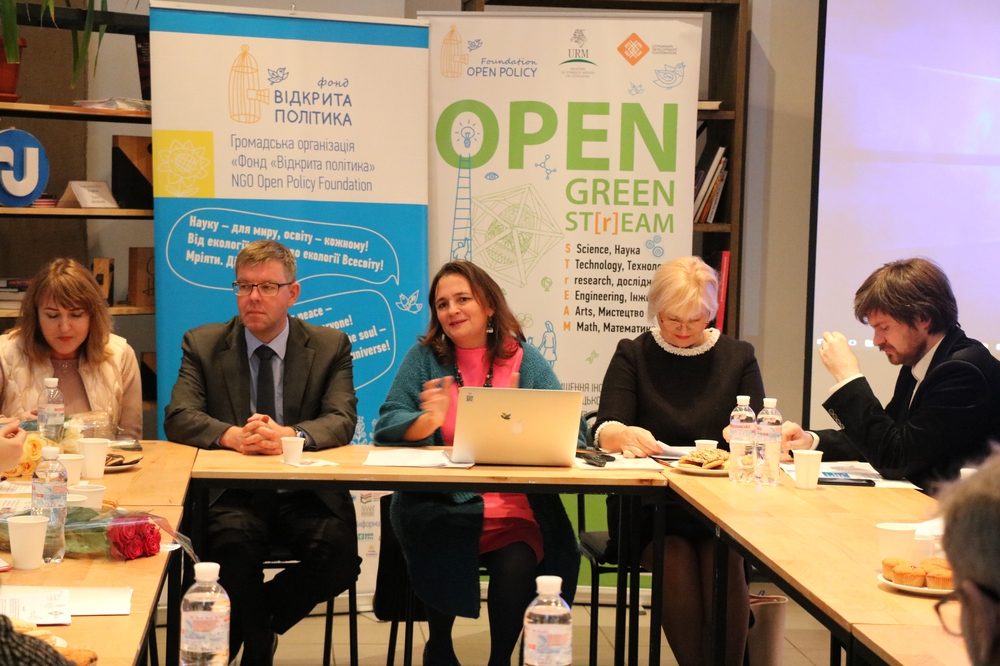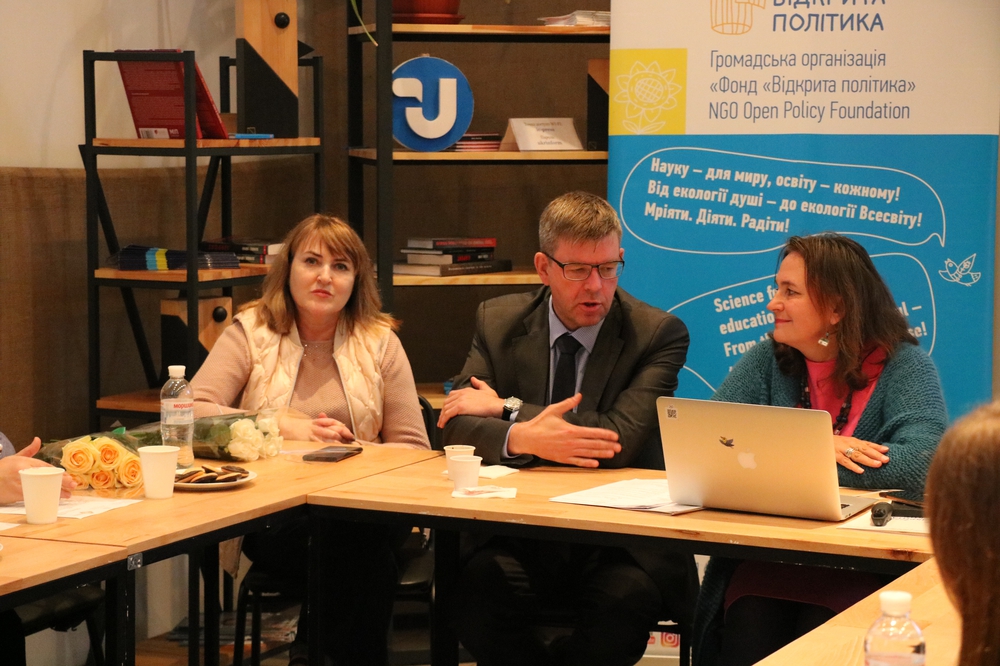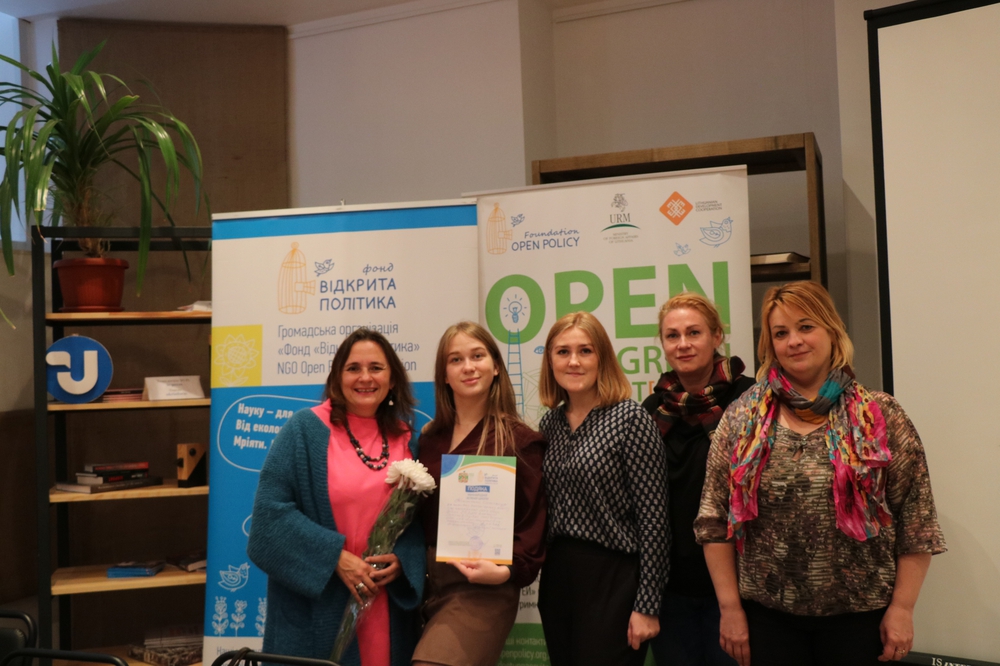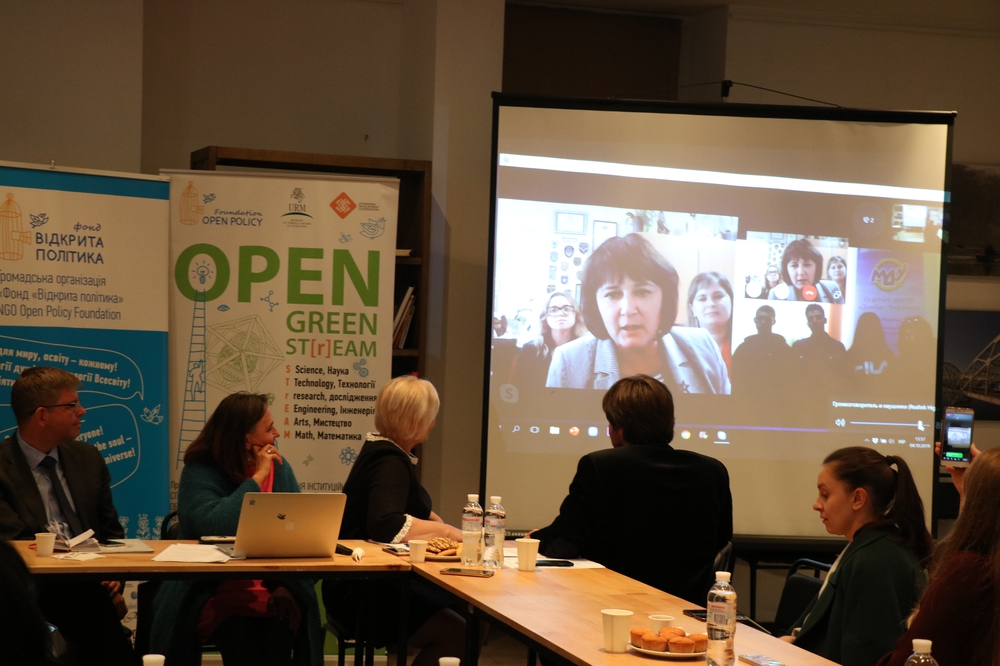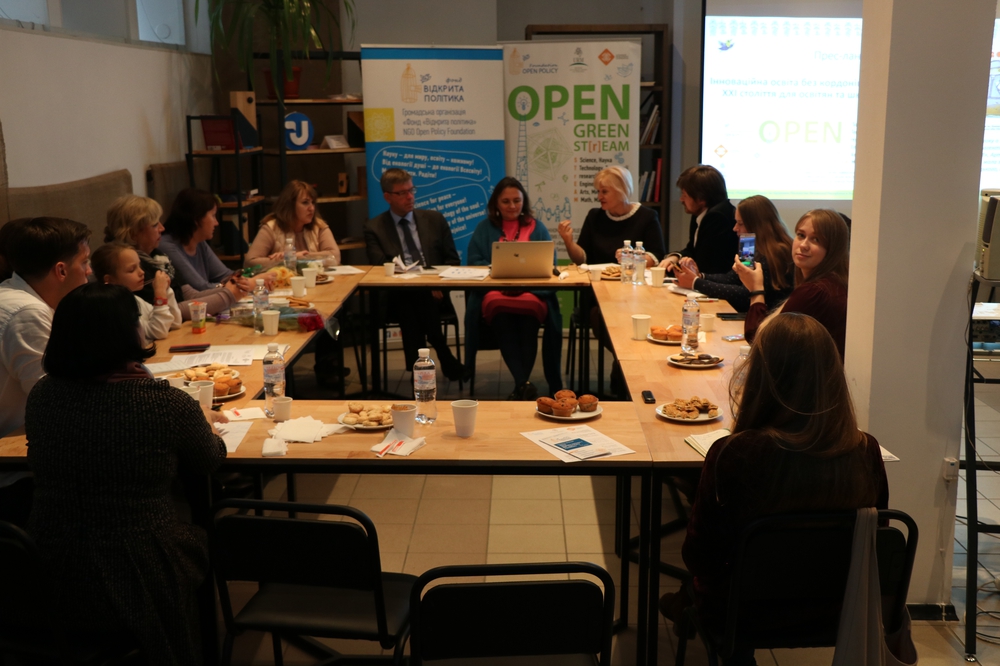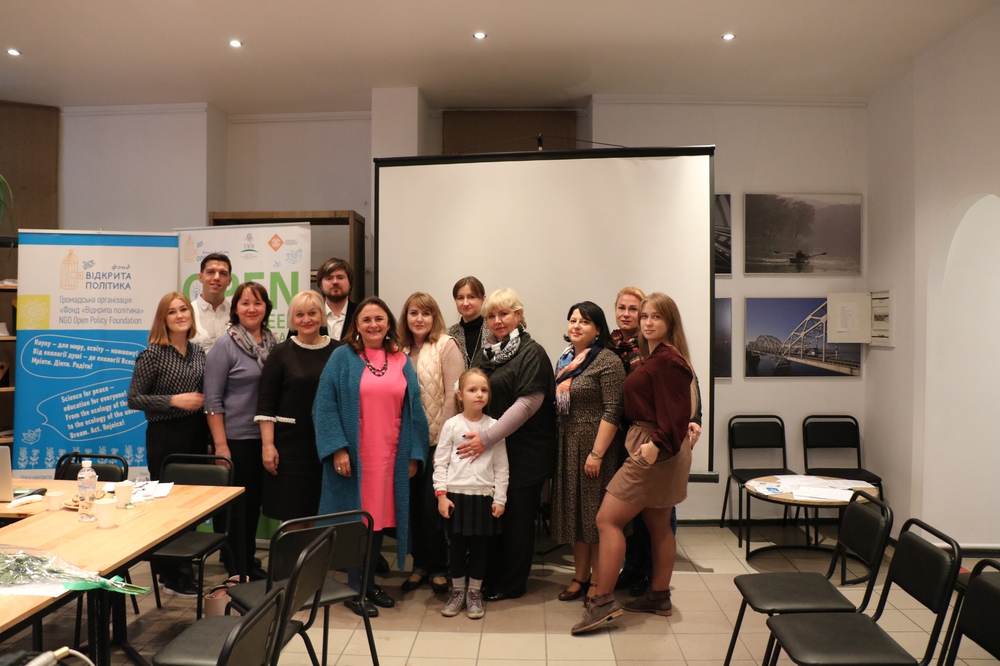News
Innovative education without borders: The Foundation brought educators and students from the East, donors, officials and journalists together
Oct. 7, 2019, 6:01 p.m.Innovative education without borders: The Foundation brought educators and students from the East, donors, officials and journalists together at one table
“This place helped me meet a lot of interesting people, but it was very scary because I had never travelled outside of my city. For me, it was shock therapy, I mean the positive one”, Svitlana Hukova, “Pearl of Donetsk”, Sviatohirsk.
“Every day I wake up and fall asleep, and it seems to me, that it's a dream. Such beautiful people, wonderful teachers, friends are near. This was the best place I've ever been in my life,” Yehor Chabanov, Rubizhne, 16 years old.
“I realized - there is no need to be afraid to learn at any age,” Alla Babenko, the teacher of biology and geography, Sieverodonetsk.
Here are the impressions of people who participated in Science & Digital [not]School at the International Green School. Such impressions have already gone to the East and were announced at a press breakfast on October 4, 2019, at the UKRINFORM’s Art Hub entitled “Innovative Education without Borders: 21st-Century Education Principles for Educators and Students from the East”.
The organizer: The NGO “Open Policy Foundation” with the support of the Embassy of the Republic of Lithuania in Ukraine and the Development Cooperation and Democracy Promotion Programme of the Ministry of Foreign Affairs of Lithuania.
Participants:
Marius YANUKONIS, Ambassador Extraordinary and Plenipotentiary of the Republic of Lithuania to Ukraine;
Iryna ZHDANOVA, Executive Director of the NGO “Open Policy Foundation”, PhD in History, Founder of Klym Churyumov International Green School.
Educators from the East:
Yana GARKAVETS, Elementary School Teacher, Kremin Secondary School # 4;
Svitlana KYRYCHOK, Acting Head of the Education Department at the Yasynuvata District State Administration.
Students of displaced higher education institutions
Oleksandra KONONENKO, Ambassador of the IGS, 3-rd year student, the “Biology” speciality, Luhansk Taras Shevchenko National University, Starobilsk.
Tetiana SIDASHEVA, Acting Director of the Department of Education and Science at the Donetsk Regional State Administration.
And:
Valentyna HIVRYCH, Director-General of the Directorate of Inclusive and Extracurricular Education at MoES;
Volodymyr BOZHYNSKYI, Expert Group Head of the Directorate of Pre-school and School Education at MoES.
Participants via Skype:
Natalia MATSAY, Dean of the Department of Natural Sciences at Luhansk Taras Shevchenko National University;
Olga HUBSKA, Senior Lecturer of the Department of Landscaping Services and Environment at Luhansk Taras Shevchenko National University;
Alina LATKA, Deputy Dean of the Department of Natural Sciences at Luhansk Taras Shevchenko National University, Deputy Head of EC at LTSNU;
Olena GLUSHCHENKO, 4th-year student, the “Secondary education. Biology” speciality;
Natalia SKOROHOD, 4th-year student, the “Secondary education. Geography” speciality;
Natalia SARANA, Teacher of Geography, Biology and Chemistry at the Communal Educational Complex “Secondary School №5 – Pre-school Institution (Kindergarten)” of Rubizhne City Council, Luhansk Oblast;
Viacheslav KUDLAY, Head of the “Donbas-Ukraine” Education Centre, Mariupol State University
Students of Mariupol State University who entered through the “Donbas-Ukraine” Education Centre:
Artem (1st-year student, system analysis, Starohnativka), Gunel (1st-year student, practical psychology, Snizhne), Danylo (1st-year student, history and archaeology, Donetsk), Nadiya (3d-year student, pre-school education, Sartana).
At the press breakfast, they discussed issues of access to and prospects of innovative education development for children, young people and teachers affected by the military conflict in Eastern Ukraine - the region that needs the most support from civil society of the country and international partners.
During an informal coffee meeting, the participants discussed the following issues:
- Science & Digital camps for students: peacebuilding through innovation and creating a 21st-century learning space for Generation Z;
- Educational needs in 2020-2025 in Eastern Ukraine: strategy and action plan;
- Training teachers and students of pedagogical higher education institutions on innovative methods of teaching: STEM/STrEAM based on the openschooling principles at Klym Churyumov International Green School;
- The formula “money follows the teacher”: risks and prospects of public-private & public-civil partnership.
Iryna ZHDANOVA spoke about the results of the Summer and Autumn Science&Digital [not]School that held this year within the Let's Open Green STrEAM project for educators, students and school children; as in the past year, the School was supported by the Embassy of the Republic of Lithuania in Ukraine and the Development Cooperation and Democracy Promotion Programme of the Ministry of Foreign Affairs of Lithuania.
“This year, thanks to the Lithuanian Embassy, we have continued a series of training workshops for teachers from Luhansk and Donetsk oblasts that started last year. This year we conducted the Summer and Autumn Science & Digital [not]Schools for educators, students and school children,” Iryna ZHDANOVA said.
In total, 56 participants took part in these two [not]schools. Among them, there were teachers and students from pedagogical universities and colleges, teachers and school children from Kurakhove, Myrnohrad, Starobilsk, Rubizhne, Mariupol, Luhansk, Mariinka, Bakhmut, Kramatorsk, Sieverodonetsk, Lysychansk, Yasynuvata, Dobropillia, Kreminna and Sviatohirsk.
The [not]School modules are aimed at the implementation of innovative STEM/STrEAM teaching methods, digital cases, media and soft skills acquisition, innovative management practices (SCRUM management) during the organization of educational innovation camps.
During the training, both Open Green STrEAM laboratories worked together for senior school students and volunteer students, who together with their lecturers and teachers studied the principles of 21st-century education; the laboratory provided a model for inclusion of school children/students in the educational process and creation of a common educational space using modern digital tools.
Iryna ZHDANOVA noted that thanks to the support of the Embassy of the Republic of Lithuania, this year not only managers and educators were trained at the International Green School during the School & Digital [not]School, but, for the first time, students and senior school students were also trained together in the same space.
“Access to the education of the state model for children and young people from occupied territories can be ensured only if there is fibre-optic Internet in every educational institution where school children and students from the non-government controlled areas of Ukraine are studying. At the same time, 21st-century education means not only gadgets, technology and fibre-optic internet; it is not only integrated learning but also the inclusion of students and school children in the learning process not only as those who need knowledge but also as those who can teach and help. Therefore, the main idea of our [not]School is to train mentors and coaches, who will implement innovative education in Donetsk and Luhansk oblasts together with ambassadors from students and senior school students,” explained Executive Director of the NGO “Open Policy Foundation,” Founder of Klym Churyumov International Green School.
Ambassador Extraordinary and Plenipotentiary of the Republic of Lithuania to Ukraine Marius YANUKONIS also said that education is one of the main areas for Lithuania to support.
“Education is an area that we support because, firstly, it is a very important area, and secondly, we see the Ministry of Education's efforts in reforming the education sector and we see positive changes, so we want to support these efforts. And thirdly, if possible, we try to support those projects that are related to the Donbas because it is an opportunity to give a perspective of quality life for children in the East, increase their self-confidence, and it is also the opportunity to share the best European experience in education with Donetsk and Luhansk oblasts,” Marius YANUKONIS said.
Ambassador Extraordinary and Plenipotentiary of the Republic of Lithuania to Ukraine also expressed his gratitude to the Open Policy Foundation for its work with teachers, young people and children from the East: “I am grateful to the Open Policy Foundation, which is one of our partners in the field of education, for these changes which were gradually done for teachers and children. And I think we will continue this.”
Iryna ZHDANOVA highlighted access to education not only for children and young people but also for teachers. And the main thing having access to education in the East is to have the fibre-optic Internet in every educational establishment without which it is impossible to have innovate education, support distance learning and activities of the “Donbas-Ukraine” Education Centres.
“Universities and schools in the East are the only venues where teachers, children, youth and parents from the occupied territories and peaceful areas can meet and be engaged in a dialogue. I do not see any more such platforms for dialogue today. That is why we need to be aware of this and to preserve such venues for peacebuilding,” Iryna ZHDANOVA summed up.
Tetiana SIDASHEVA, Acting Director of the Department of Education and Science at the Donetsk Regional State Administration spoke about the educational needs of the Donetsk region.
“Year after year, we have gained experience in organizing distance learning, developing hub schools … We are moving and not standing still. Due to joint efforts, we have overcome many problems. And we do our best to ensure that children from the occupied territories have access to education and that people feel the support of the state and international partners in this difficult situation,” Tetiana SIDASHEVA said.
Representatives of the Ministry of Education and Science Valentyna HIVRYCH, Director-General of the Directorate of Inclusive and Extracurricular Education, and Volodymyr BOZHYNSKYI, Expert Group Head of the Directorate of Pre-school and School Education at MoES also supported colleagues in the development of innovative education and access people from non-government controlled areas to such education.
“The state is now doing and did everything to ensure that children from non-government controlled areas can continue their education. Then, I want to say that before the warfare began, the Donetsk region was very well developed regarding information technology. We had training with the support of international donors, and all teaching staff was trained. I mean to what extent educators can use information technology there. Then, we have already raised the question that if the school starts actively using Internet technologies, nowadays local authorities have the opportunity to open additional staff positions in such schools,” Valentyna HIVRYCH emphasized.
Volodymyr BOZHYNSKYI added: “Probably one of the most important tasks of policy-making, after the formation of the system of scientific lyceums and the system of scientific education, was the question how to form a system of professional training of pedagogical workers. How to make this system work more effectively ... One of the tasks we wanted to set before ourselves and the system itself was that postgraduate education institutions stopped receiving complains about their work and started developing and being closer to people.”
Representatives of Luhansk Taras Shevchenko National University, which was displaced to Starobilsk, and Mariupol State University have also contacted the press breakfast participants via Skype. The “Donbas-Ukraine” Education Centres operate at these universities.
“For several years, we have been participating in the Open Policy Foundation’s training workshops regarding the accessibility of education. This year, the International Green School was visited by our students, who were already ambassadors, were developing a network and implementing innovative educational technologies. This is exactly what is needed in the East. We would like to thank the Foundation for its willingness to sign a memorandum on cooperation with us. This is very important for the preparation of future specialists and teachers of biology, geography and natural sciences,” said Natalia MATSAY, Dean of the Department of Natural Sciences at Luhansk Taras Shevchenko National University.
Viacheslav KUDLAY, Head of the “Donbas-Ukraine” Education Centre at Mariupol State University, shared the results of the 2019 admission campaign.
“This year, the number of participants who used the “Donbas-Ukraine” Education Centres to enter high educational institutions has significantly increased. In 2019, 97 entrants used the simplified procedure to enter Mariupol State University on the state-funded basis,” Viacheslav KUDLAY said.
Students of Mariupol State University told about their success stories of admission.
“My name is Gunel, I graduated from the Secondary School # 54, taking an external degree, and passed IEE, but I decided to enter through the Education Centre and immediately started the state-funded education. I entered the Philology Department. I am a future psychologist,” said the student of the 1st year of Mariupol State University Gunel from Snizhne, Donetsk Oblast.
“My history is that I studied in Donetsk, and when I got to know about the “Donbas-Ukraine” programme, I took my documents and came to enter Mariupol State University,” said the student of the 1st year of Mariupol State University, the speciality in History and Archaeology, Danylo, from Novyi Svit, Donetsk Oblast.
“I passed an entrance exam in physics because I did not pass IEE and entered through the “Donbas-Ukraine” EC on the state-funded basis,” said Artem, 1st-year student, the speciality in system analysis, Starohnativka.
“When I found out that there was the “Donbas-Ukraine” programme, I took advantage of it and entered on the state-funded basis,” said Nadiya, the 3d-year student of Mariupol State University, the speciality in pre-school education, Sartana.
A video about Science & Digital [not]School at the International Green School was presented at the press breakfast: https://www.youtube.com/watch?v=MJo_Gxz0h3A&feature=youtu.be
After the official part, the participants had the opportunity to talk with representatives of the Ministry of Education and Science, educators and students from Donetsk and Luhansk oblasts, as well as donors.
The video of the event can be viewed on the Open Policy Foundation’s Facebook page at https://www.facebook.com/OpenPolicyFoundation/videos/2442789672443028/
More information: openpolicy.org.ua, dostupnaosvita.com.ua

